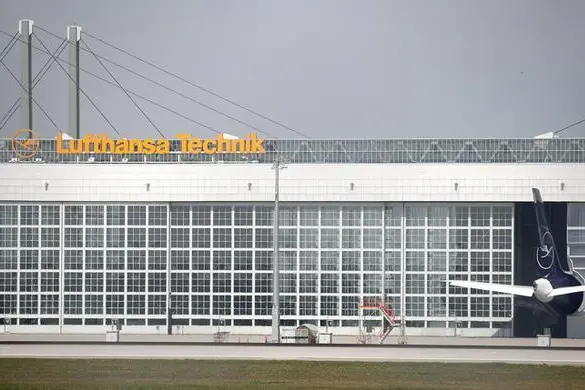PHOTO
Lufthansa Technik Middle East has always been at the forefront of sustainable aviation, which is why the group has been collaborating with world-renowned conservationist brands like BASF to help preserve the environment, reduce energy, and fuel consumption, said Ziad Al Hazmi, chief executive officer, Lufthansa Technik Middle East (LTME).
Al Hazmi said: “Our AeroSHARK technology — product of BASF collaboration — helps reduce fuel consumption by 3,700 tonnes and CO2 emissions by up to 11,700 tonnes. Hydrogen fuel technology is also an area of development for us, and we are currently performing fuel infrastructure testing to prepare ourselves for what is, this greener form of energy.”
The company is also currently working with Sanad — the global aerospace engineering and leasing solutions leader wholly-owned by Mubadala Investment Company (Mubadala) — to optimise Maintenance, Repair and Overhaul (MRO) processes through the use of technologies such as Artificial Intelligence (AI) and Virtual Reality (VR). The purpose behind the agreement — signed during Dubai Airshow 2021 — is to support growing digitalisation requirements of MRO businesses by investing in research and development for a digitalised future.
In line with the UAE’s strategic initiative ‘Operation 300bn’ and its focus on deploying Fourth Industrial Revolution (4IR) technologies, the two companies aim to streamline their maintenance processes through these digital capabilities by developing and implementing digital solutions set to reduce turnaround times and costs, ultimately to better serve their end-customers.
“Our collaboration with Lufthansa Technik has identified common areas of improvement across MRO processes, and this agreement will seek to address these by reducing turnaround times,” Mansoor Janahi, deputy group CEO of Sanad, said. “The partnership plays a vital role in enhancing our processes and will enable our teams to be able to support a greater number of customer projects and maintain our position as a leading global MRO service provider.”
The collaboration with Sanad, and use of new technological tools should help LTME digitalise MRO processes and eliminate redundant ones, along with regulatory approvals for remote inspection; ultimately leading to a more timely exchange of information.
LTME’s contribution to the collaboration can build on Lufthansa Technik Group’s long-standing experience in the digitalisation of MRO processes, that in the past already stretched from advanced robotics and virtual as well as augmented reality to private networking, artifical intelligence and predictive algorithms, just to name a few
Al Hazmi explained: “Our top three areas of focus for 2022 at the moment are on optimising our MRO processes to increase its efficiency, capability buildup by using the latest developments in digitalisation and technology, and growth in terms of capability, production capacity and local capacity. We are always looking to collaborate with different universities in the UAE, such as Emirates Aviation University, the American University of Sharjah, and Abu Dhabi Polytechnic to help add value to the education sector, while also sourcing great local talent.”
As the pandemic has played out differently in various countries, so too has the aviation recovery. Some domestic markets are already close to a return to 2019 demand levels, while others are not even halfway there. International demand is down dramatically across all regions, says Global fleet and MRO market forecasts 2021-2031 by Oliver Wyman.
The research points out at mainly four factors that may impact the recovery of MRO sector include the epidemiological timeline and public health response; traveler sentiment; government restrictions; and macroeconomic recovery that will affect both the leisure and business travel markets. Business travel demand will also be tempered by a permanent increase in the use of telecommuting and videoconferencing technologies, which have been more widely disseminated during the pandemic.
Globally, Oliver Wyman expects passenger demand to reach 2019 levels by the end of 2022, with a long-term compound annual growth rate (CAGR) of three percent through 2031. As with economic projections, there is uncertainty associated with passenger demand recovery estimates. Asia is expected to recover quickest, with total passengers — including international — reaching 2019 levels in early 2022. In fact, domestic travel in China saw year-over-year growth toward the end of 2020. The Middle East has the slowest recovery timeline, attributable to an outsized exposure to international travel compared to other regions.
Copyright © 2021 Khaleej Times. All Rights Reserved. Provided by SyndiGate Media Inc. (Syndigate.info).





















